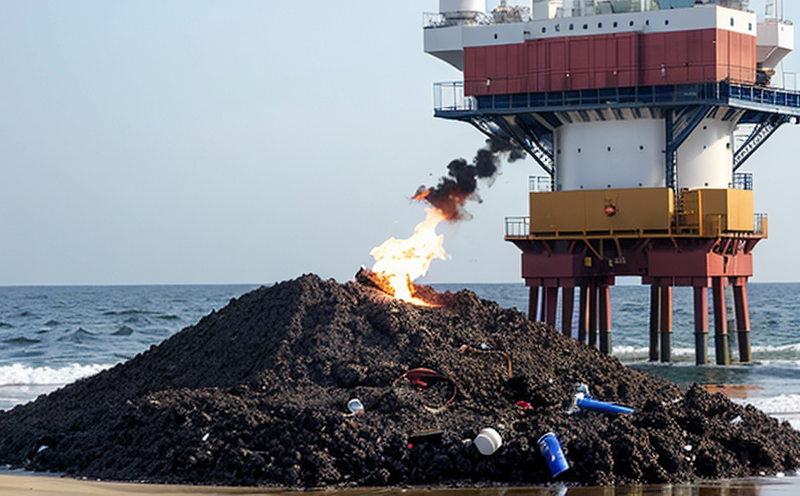Material Degradation Testing for Offshore Platforms
Understanding Material Degradation Testing for Offshore Platforms A Crucial Service for Industry Success
As the global energy market continues to evolve, offshore platforms have become an essential component of oil and gas production, as well as renewable energy generation. However, the harsh marine environment poses significant challenges to the integrity and longevity of these structures materials. Material degradation testing for offshore platforms is a laboratory service that ensures the reliability and safety of these critical infrastructure components.
At Eurolab, we provide an unparalleled level of expertise in material degradation testing for offshore platforms. Our state-of-the-art facilities and cutting-edge technology enable us to simulate real-world conditions, accurately assessing the impact of environmental factors on materials performance. By investing in this service, businesses can confidently optimize their operations, reducing downtime and minimizing costs associated with maintenance and repairs.
The Importance of Material Degradation Testing for Offshore Platforms
Inadequate material degradation testing can have severe consequences for offshore platforms
Safety Risks Substandard materials can compromise the structural integrity of platforms, posing significant safety risks to personnel.
Equipment Downtime Failure to detect material degradation can lead to costly repairs and extended downtime, affecting production schedules and bottom-line profits.
Environmental Concerns Material failure can result in oil spills or other environmental disasters, with devastating consequences for ecosystems and local communities.
Advantages of Using Material Degradation Testing for Offshore Platforms
Eurolabs material degradation testing service offers numerous benefits to businesses operating in the offshore industry
Key Benefits
Preventive Maintenance Early detection of material degradation enables proactive maintenance strategies, minimizing unexpected downtime and reducing repair costs.
Improved Efficiency By identifying potential issues before they become major problems, operators can optimize production schedules, ensuring maximum productivity and revenue.
Enhanced Safety Regular material testing ensures the continued integrity of offshore structures, safeguarding personnel and protecting against catastrophic failures.
Reduced Costs Investing in material degradation testing now can save businesses substantial sums in the long term by preventing costly repairs and replacements.
Benefits for Different Stakeholders
Operators Material degradation testing helps ensure compliance with regulatory requirements, reducing the risk of penalties and reputational damage.
EPCs (Engineering, Procurement, and Construction) Contractors By providing reliable material data, Eurolabs service enables EPC contractors to make informed design and installation decisions, minimizing the risk of costly rework or repairs.
Inspectors and Auditors Regular material testing provides inspectors and auditors with valuable insights into platform conditions, facilitating more effective risk assessments and safety evaluations.
Benefits for Different Materials
Metals Material degradation testing for metals enables operators to detect corrosion, fatigue, and other issues affecting steel and aluminum components.
Composites Testing of composite materials helps identify potential weaknesses and defects, ensuring the continued integrity of these critical infrastructure components.
Polymeric Coatings Eurolabs service assesses the performance and durability of polymeric coatings, guaranteeing optimal protection against corrosion and other environmental factors.
QA Material Degradation Testing for Offshore Platforms
Q1 What is material degradation testing?
A1 Material degradation testing involves simulating real-world conditions to accurately assess the impact of environmental factors on materials performance. This service helps identify potential weaknesses and defects, enabling proactive maintenance strategies and minimizing unexpected downtime.
Q2 Why is material degradation testing essential for offshore platforms?
Q2 Inadequate material degradation testing can have severe consequences for offshore platforms, including safety risks, equipment downtime, and environmental concerns. By investing in this service, businesses can confidently optimize their operations, reducing costs associated with maintenance and repairs.
Q3 What types of materials are typically tested using Eurolabs services?
A3 Our laboratory specializes in testing a wide range of materials used in offshore platforms, including metals (steel, aluminum), composites, and polymeric coatings. We also provide customized testing solutions for specific materials or applications.
Q4 How does material degradation testing contribute to safety and efficiency?
A4 Material degradation testing enables operators to detect potential issues before they become major problems, minimizing unexpected downtime and reducing repair costs. Regular testing also ensures the continued integrity of offshore structures, safeguarding personnel and protecting against catastrophic failures.
Conclusion
Material degradation testing for offshore platforms is a critical service that ensures the reliability and safety of these complex infrastructure components. By investing in Eurolabs laboratory expertise, businesses can confidently optimize their operations, reducing costs associated with maintenance and repairs while ensuring compliance with regulatory requirements. Contact us to learn more about how our material degradation testing services can benefit your business.
Additional Resources
Material Degradation Testing for Offshore Platforms Brochure(link)
Material Degradation Testing for Offshore Platforms Whitepaper(link)




